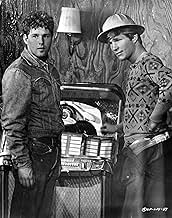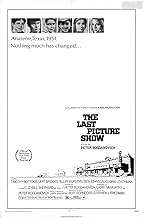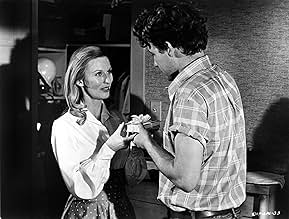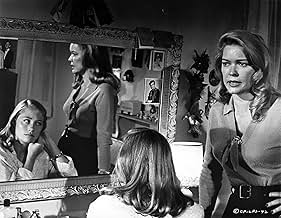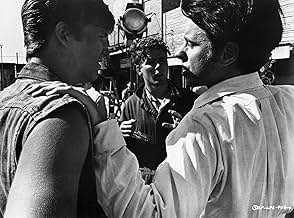In 1951, a group of high schoolers come of age in a bleak, isolated, atrophied North Texas town that is slowly dying, both culturally and economically.In 1951, a group of high schoolers come of age in a bleak, isolated, atrophied North Texas town that is slowly dying, both culturally and economically.In 1951, a group of high schoolers come of age in a bleak, isolated, atrophied North Texas town that is slowly dying, both culturally and economically.
- Won 2 Oscars
- 19 wins & 22 nominations total
- Charlene Duggs
- (as Sharon Taggart)
Featured reviews
There is no musical score in this film in the normal sense. The only time you hear music is when a radio is on or a phonograph is playing in the background. This lack of a musical score dubbed over the film enhances the illusion of reality. Another aspect of this sound editing is the choice of music that is being played by the different characters. Bogdonavitch uses song and artist selection to subtly comment on the character of the person or people who are listening to it. In the case of Sonny the music he selects is always Hank Williams and it alludes to the hardscrabble life and down to earth quality of his character. In contrast at JC's home, the manipulative teenager played by Cybil Sheppard, you hear a cover of a Hank William's song that has all of the life sucked out of it, similar to a Pat Boone cover of an Elvis Presley song. It is a direct comment on JC and her family; her family has grown wealthy by owning oil wells and they pretend they are still the same people as before. It is obvious they are not just by this simple musical selection. It is eloquent in its simplicity.
The center of the film and the major theme should you listen to your heart or your libido if the two don't combine in the same person? Perhaps the saddest comment in this film is that too often these two halves to a whole do not come together as a package and people are forced to chose. None of the characters are particularly happy with their mates. Everyone is on the prowl for that perfect person they know they will be happy with. Time and again they think that they've found the perfect person based on their sexual attraction but when they begin to show their authentic selves are then rejected. Those in long term relationships with an emotionally compatible mate but with no sexual interest face an equal dilemma a lack of excitement and joy and are destined to be the ones that reject. It exposes both sides of this human dilemma, a duality that can become split and non-integrated, and does it in a sophisticated and lyrical way. Most people experience this split at some time and in this film, as in life, there are no easy answers. That's why I love this film.
And there is Billy, the boy who continually sweeps the street in a hopeless gesture to turn back the inevitable, representing that demented and futile longing for a past that was never quite as good as you remember it. He represents that longing for an illusion that disappears just as we are about to grasp it and the sadness of that. The broom that is never fast enough for the blowing dust of time.
Bogdanovich's love affair with film is undeniable, though it has, in the past three decades, yielded far more perplexing misfires (The Cat's Meow, At Long Last Love, Nickelodeon) than unqualified successes. That said, The Last Picture Show is an extraordinary accomplishment and worthy of its place in the list of great films of the 1970s.
1971's other important films (Friedkin's The French Connection, Pakula's Klute, Kubrick's Clockwork Orange) are loud, angry, violent and contemporary in-your-face reflections of a society in which rage and nihilism, engendered by Vietnam and the growing discontent over government corruption, is the currency of communication. The uncertainty coursing through the veins of American pop culture also begat in equal, if not equally graphic, measure a palpable sense of sorrow at the destruction of a simpler way of life (no matter how "true" that memory may be).
Like Jewison's Fiddler on the Roof and Altman's McCabe & Mrs. Miller, The Last Picture Show is a powerful and poignant evocation of the death of a community and a way of life. Thematically rich and imbued with Bogdanovich's remarkable knowledge and passion for film, the movie works on a dazzling number of levels; and Bogdanovich's use of nostalgia and traditional, archetypal genre conventions both enriches the movie and compounds the heartbreaking loss at the heart of the story.
His deft handling of a cast comprised of then (largely) unknowns (Bridges, Bottoms, Shepherd) is first-rate and he draws forth superb, often sublime performances from everyone (in particular, Johnson, Burstyn and Leachman). There isn't a false note or a misstep in the movie and there is a naturalness here that is not easily achieved or earned. The great production design (by Bogdanovich's then wife and partner Polly Platt whose contributions to his work and her subsequent involvement in the best works of James L. Brooks should not go underestimated) and the achingly beautiful cinematography by the late Robert Surtees are vital to the success (emotionally, intellectually, thematically) of the film.
The Last Picture Show is a truly rare work of surprising depth and emotional resonance; and the heartache for a time and place forever gone and the desperate and quiet struggles of its very real, very human denizens is matched only by the sorrow found in contemplation of Bogdanovich's Icarus-like fall from such exalted heights.
This is one of those rare movies that you can go back every five years and watch for the first time. Myself having been raised in Del Rio, Texas in the late 50's and early sixties, I can attest that this is a totally accurate picture of what coming of age in west Texas was really like for most of us.
Did you know
- TriviaAt 9 minutes and 54 seconds, Ben Johnson's performance in this movie is the shortest ever to win an Academy Award for Best Supporting Actor.
- GoofsThe lavalier mic on Duane's tie is visible during the graduation scene.
- Quotes
Sam the Lion: You boys can get on out of here, I don't want to have no more to do with you. Scarin' a poor, unfortunate creature like Billy just so's you could have a few laughs - I've been around that trashy behavior all my life, I'm gettin' tired of puttin' up with it. Now you can stay out of this pool hall, out of my cafe, and my picture show too - I don't want no more of your business.
- Alternate versionsSpecial edition includes seven minutes of footage not included in the original release.
- ConnectionsFeatured in The Last Picture Show Re-Release Promo (1971)
- SoundtracksCold, Cold Heart
(uncredited)
Written by Hank Williams (as Hank Williams Sr.)
Performed by Tony Bennett
Details
- Release date
- Country of origin
- Language
- Also known as
- La Última Película
- Filming locations
- 605 South Ash Street, Archer City, Texas, USA(high school)
- Production companies
- See more company credits at IMDbPro
Box office
- Budget
- $1,300,000 (estimated)
- Gross US & Canada
- $29,133,000
- Gross worldwide
- $29,146,746
- Runtime1 hour 58 minutes
- Color
- Sound mix
- Aspect ratio
- 1.85 : 1
Contribute to this page






